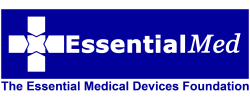GlobalO2
.jpg)
Oxygen is an essential medicine for the treatment of many life-threatening conditions prevalent in low- and middle-income countries (LMICs), yet it remains out of reach for the vast majority of those who need it. For the population that lives outside of cities, access to oxygen is even more scarce, exacerbated by fragile transport, power, and healthcare infrastructure.
The challenge : Lack of access to medical oxygen
The lack of reliable oxygen sources in LMICs can be attributed to, on the one hand, poor supply chain and high costs that make provision of compressed air cylinders impracticable and, on the other, technical issues that defeat traditional oxygen delivery equipment. The oxygen concentrators that are the main source of oxygen in LMICs have a high failure rate because they:
- Are designed for residential use in high-income countries
- Require continuous and stable power
- Are susceptible to high humidity and heat
- Lack service networks for preventive and urgent maintenance
Our adapted solution : Oxygen provision services and adapted oxygen concentrator
An innovative oxygen concentrator with extremely reduced power consumption, resilient to power cuts, and humidity-resistant sieve beds, integrated into a comprehensive fee-for-service model integrating equipment, training and maintenance.
ACHIEVEMENTS
On the tech side, our latest achievements are the following:
- We built a proof-of-concept of a robust power supply, integrating batteries that provide 2 hours of autonomy.
- The power supply further demonstrates extremely reduced power consumption, complying with the Unicef requirement.
- A new material was developed using hydrophobic coating, which demonstrated humidity resistance.
- The integration of internal sensors allows continuous oxygen purity display as well as remote monitoring of the device.
On the fee-for-service model research side, these are the latest results:
- More than 100 pieces of medical equipment, including oxygen concentrators and pulse oximeters, were installed in 20 primary healthcare facilities in Bungoma County, Kenya.
- Clinical application training was provided to 66 healthcare workers, technical training was provided to 16 biomedical engineers.
- Using this infrastructure, over 30’000 patients were screened over 6 months, out of which more than 300 were treated. Around 300’000 liters of oxygen were provided to these patients.
- A 3-tiered maintenance procedure was implemented, leveraging the biomedical engineers already employed in the 20 facilities, strengthened by the training provided.
- Dramatic reduction of referrals to higher level hospitals: less than 25% of cases were referred, and less than 5% of these due to oxygen.
NEXT STEPS
The next phase of research and development will focus on the remote monitoring of the device and on mainstreaming the manufacturing process of the humidity-resistant material. This will then enable the transfer of this technology to an industrial partner.
main photo @ICRC/Albert Gonzalez Farran



Nathalie holds an M.A. in Social Sciences. She has a rich background in humanitarian work and social impact projects, working with NGOs and international organizations. She has led diverse teams across Sub-Saharan Africa, the Balkans, Central America, and Switzerland, fostering cross-disciplinary collaboration and building cross-cultural partnerships to develop impactful solutions that advance societal progress. Her core areas of expertise include post-crisis recovery, gender-based violence, and forced migration.In her previous roles, Nathalie worked with the International Organization for Migration (IOM) in Geneva on anti-human trafficking interventions and served as an independent consultant specialising in strategic planning for humanitarian initiatives. She also contributed to socio-economic integration programs for refugees in Switzerland. Nathalie joined EssentialTech in 2021 as Head of Stakeholder relations and Fundraising before taking the Head of the Sustainable Development Division in 2023, Nathalie leads interdisciplinary innovation projects that strategically leverage technology to develop sustainable solutions for vulnerable communities. Her work focuses notably on improving access to essential health services, including neonatal care, oxygen therapy,and assistive devices, while empowering healthcare professionals and institutions in low-resource settings.



Dr. Yan-Kim Tran is a skilled power electronics engineer specializing in DC-DC power conversion for medium-voltage applications. With expertise spanning the entire lifecycle of power supply systems—from simulation and component design to hardware assembly and control firmware—he has contributed to a wide range of projects, from small-scale power solutions to multi-megawatt systems.
Yan-Kim earned both his Master’s degree in Electrical and Electronic Engineering (2013) and his PhD in Power Electronics (2019) from EPFL. His extensive professional experience has shaped his ability to develop innovative and resilient power supply technologies.
Since joining the EssentialTech Centre in 2022 as a development engineer for the GlobalO2 project, Yan-Kim has played a key role in designing life-saving medical technologies, including a robust oxygen production device and a neonatal incubator for resource-limited and challenging environments. His recent work has reinforced his expertise in innovation under technical and economic constraints, emphasizing deployment, maintenance, and user-centric design.
Curious, motivated, and highly adaptable, Yan-Kim is passionate about creating impactful solutions at the intersection of power electronics, embedded systems, and sustainable technology.



Holding an MSc in Electrical Engineering from EPFL, Matthieu has led projects focused on developing appropriate technologies and sustainable business models for the Global South. He has a strong background in technical training, technology transfer, and fostering collaborations between academia and industry. Fluent in French, English, and German, Matthieu brings expertise in managing multidisciplinary teams and creating impactful solutions in medtech.
.png)
Tech4Dev

SmartCervix
.png)








